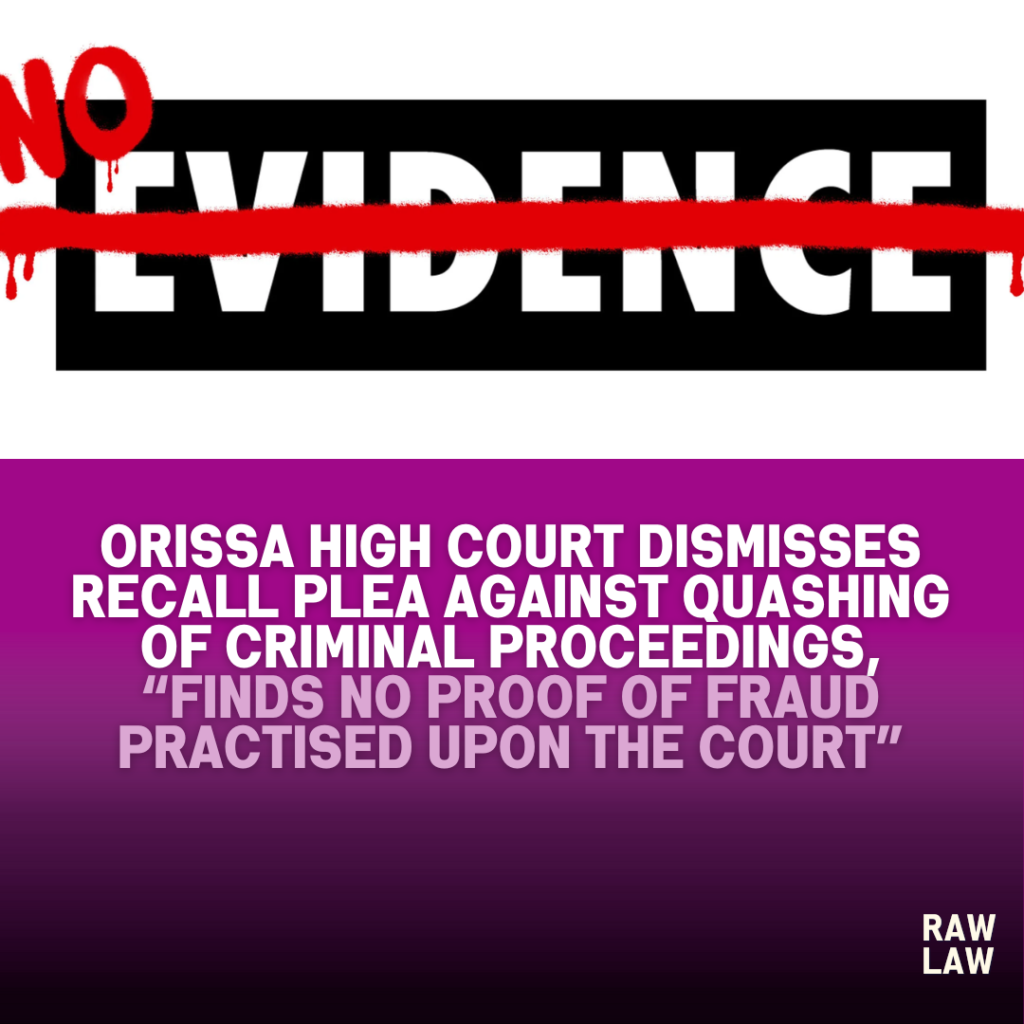“Fraud must not only be alleged but proved to satisfaction to have been practiced”—Orissa High Court refuses to recall quashing of FIR under Section 482 CrPC in absence of concrete evidence of fraud
Court’s Decision
The Orissa High Court dismissed an interlocutory application filed under Section 482 of the Code of Criminal Procedure, seeking recall of an earlier order that had quashed a criminal proceeding based on a joint compromise. The Court held that in the absence of sufficient proof of fraud, it cannot invoke its power to recall the previous order, especially in light of the bar under Section 362 of the Code of Criminal Procedure.
Facts
An application under Section 482 of the Code of Criminal Procedure was filed by the accused persons seeking quashing of a criminal case registered under Sections 420, 427, 294, 328, 380, 506, and 34 of the Indian Penal Code. The case arose out of a First Information Report lodged by one Ashis Tiberwal, an employee of M/s Wellshown Retail LLP. During the pendency of the quashing petition, both parties filed a joint affidavit and a deed of compromise, stating that the dispute had been settled mutually. Taking this into account, the High Court quashed the proceedings on 3 April 2023.
Subsequently, on 21 April 2023, an interlocutory application was filed by one Satish Jha on behalf of M/s Wellshown Retail LLP, claiming that the original complainant (Ashis Tiberwal) had been terminated from the company and was not authorised to settle the matter. The application sought recall of the earlier order on grounds of fraud.
Issues
- Whether the High Court can recall its earlier order passed under Section 482 of CrPC in light of the bar under Section 362 CrPC?
- Whether the quashing order was obtained by practising fraud upon the Court?
- Whether the person who filed the recall application was duly authorised to do so on behalf of the complainant company?
Petitioner’s Arguments
The applicant (Satish Jha), represented through counsel, argued that the original compromise was fraudulent since the complainant had been terminated from the company and was not authorised to act on its behalf. It was submitted that the bar under Section 362 CrPC is not absolute and the Court retains the power to recall an order if it has been obtained by fraud. The petitioner enclosed a copy of a termination letter to support the claim that the compromise was not legitimate.
Respondent’s Arguments
Counsel for the original petitioners/accused persons objected to the maintainability of the application, stating that it was filed by a person who was not a party to the original proceeding. It was further argued that the application lacked proof of fraud, as required by law to overcome the bar under Section 362 CrPC. Moreover, the letter of authorisation and termination documents were vague and unconvincing, casting doubt on the legitimacy of the applicant’s authority.
Analysis of the Law
The Court reiterated that while Section 362 of CrPC bars criminal courts from altering or reviewing a judgment once pronounced, the exception carved out by judicial interpretation is where fraud has been established. However, it emphasized that mere allegation of fraud is insufficient; it must be convincingly proved to the satisfaction of the Court.
Precedent Analysis
The Court relied on settled principles of law that permit recall of judicial orders only upon satisfactory proof of fraud. No specific citations were provided, but the decision aligns with general jurisprudence laid down by the Supreme Court, including Indian Bank v. Satyam Fibres (India) Pvt. Ltd. and other rulings that have clarified the interplay between Sections 362 and 482 of CrPC.
Court’s Reasoning
The Court noted that the only evidence of fraud cited by the applicant was an undated termination letter, purportedly issued to the complainant. However, the letter lacked formal credentials such as designation and address, and did not appear to be a genuine corporate communication. Moreover, the recall application was filed by one Satish Jha, whose status as ‘Admin’ of the LLP was undefined. The affidavit filed by one partner did not clarify his designation or role. The Court found this insufficient to conclude that the compromise was fraudulent or that the application had been properly instituted.
Conclusion
The High Court held that no concrete evidence was presented to establish fraud. The recall application was dismissed as meritless. The Court refused to interfere with its earlier order quashing the FIR based on mutual compromise.
Implications
This decision reaffirms the sanctity of final judicial orders under Section 482 CrPC and reiterates that mere allegations of fraud are inadequate for recall unless convincingly substantiated. It also emphasizes the importance of proper authorisation and procedural compliance when third parties attempt to challenge concluded proceedings.
Cases Referred
No specific case citations were provided in the judgment. However, the ruling is consistent with principles laid down in precedents such as:
- Indian Bank v. Satyam Fibres (India) Pvt. Ltd., (1996) 5 SCC 550 — on fraud vitiating judicial acts.
- General judicial interpretation on the limited exception to the bar under Section 362 CrPC in cases involving proven fraud.
FAQs
1. Can a High Court recall its order passed under Section 482 CrPC?
Generally, no. Section 362 CrPC bars recall or review. However, if it is proved that the order was obtained by fraud, the Court may recall it.
2. What proof is required to recall an order based on fraud?
Mere allegation is not enough. The fraud must be established with cogent, credible evidence that convinces the Court.
3. Can an unauthorised person file a recall application on behalf of a company?
No. The application must be filed by a duly authorised person with clear documentation. In this case, the person’s designation was unclear and not proved to be valid.



